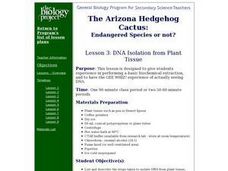Curated OER
How Do They Know That
Students explore methods for reconstructing the past. In this forest succession lesson, students examine forest succession and how to read the land in order to predict patterns of change. Students will visit a historical site, act as an...
Curated OER
My Owl Babies Miss Momma
Learners investigate the relationship between children and parents by reading a book about owls. In this story analysis lesson, students read the book Owl Babies and participate in a role play based on one of the characters....
Curated OER
Acid-Base Indicator Paper
Middle schoolers are able to prepare and use pH indicators in paper form. They find out the color of the indicator paper plus test solution may change with time. Students use red cabbage to use for the indicator.
Curated OER
DNA Isolation from Plant Tissue
Students perform an experiment to extract and observe DNA from plant Tissue. They read about the procedure and relate it to the procedure used to isolate DNA from an endangered plant species. This is lesson three in a nine lesson unit...
Curated OER
The Honey Bee Body - Paper Honey Bee
Students construct a paper honey bee to learn the six major parts of a bee and other insects. They compare their own body parts to those of bees. They utilize worksheets imbedded in this plan to help them design their bee.
Curated OER
The Way Animals Move: Fly, Crawl, or Swim?
Students use "Kid Pix" to stamp and sort animals in groups to show the way animals move: fly, walk-slither-slide-crawl, or swim. They need to have knowledge of a variety of animals and how they move from one place to another.
Curated OER
Motion of the Sun and Earth: Using a Classroom Model to Explore Rotation and Revolution
Students use a concrete model of the Sun and Earth to observe and manipulate a 3-D model of the Sun and Earth.
Curated OER
Sundials: Observing and Using Shadows
Students build sundials and observe changes in shadows over the course of one or more days. They identify patterns in the shadows and discuss how shadows may be used to tell time.
Curated OER
Elegant Embryology
Students observe embryogenesis in action through early stages of development of eggs. They observe cultures with dissecting and compound microscopes. They draw their egg, record any details and observe for changes. They compare their...
Curated OER
Frozen Film
Students discover how light reflects off surfaces. In this hands-on demonstration, students examine how variations in color are produced by light interference.
Curated OER
Making Lightening: In Your Mouth
Students look at a lightening demonstration. In this lightening lesson, students bite into a wintergreen candy while looking in the mirror in a dark room. They see sparks in their mouths if they perform the task correctly.
Curated OER
Looking Back, Up and Ahead
Students explore how scientists have forecasted the 2002 Leonid meteor shower. They pose their own predictions for peak meteor rates per hour during the 2002 shower and compare their results with actual observed rates.
Curated OER
This is Your Rock, This is My Rock
Students study the identity of rocks and minerals that can be found in Utah. They examine the characteristics that identify the rocks and minerals by using a hand lens and write them down on an index card. They role play as detectives by...
Curated OER
Motion of the Sun and Earth: Using a Playground Model to Explore Rotation and Revolution
Students experience the rotation of the Earth and the Sun and the Earth's revolution around the Sun, using a playground mode.
Curated OER
Cotton Seed Planting
Students using scientific inquiry will observe and record in daily journals their findings on cotton seeds. They measure, graph, and then communicate their discoveries about plants to each other.
Curated OER
Velocity, Acceleration, and Gravity
Students perform an experiment where a string is tied across the room. A straw is threaded onto the string, and a balloon attached to the straw. Students determine the speed of the balloon as it moves across the string. They repeat the...
Curated OER
The Aging Brain: A Lesson on Alzheimer's Disease
Students investigate the aging brain and its relationship to the occurrence of Alzheimer's disease. They need to have prior knowledge of brain and nervous system anatomy in order to participate in this lesson. Students compare an aging...
Curated OER
Investigation Xylem
Students investigate how water travels up the stem of vascular plants by using food coloring to stain the xylem of a number of different plants. They know the function of leaves, stems, and root at the end of the experiment.
Curated OER
Testing for Life
Students discuss food and the food groups and their organic nature. They test 3 different solutions and test for protein, starch and glucose. In addition, they create a master table on the board to collect all the teams results.
Curated OER
Changes in Pulse Rate
Eighth graders practice making observations and collecting data after determining a baseline pulse rate then collect data on the changes in that rate with exercise. Students must organize their data and analyze their observations.
Curated OER
The Scientist in Me
Students make a poster. In this scientist lesson, students define the term scientist, draw pictures of themselves as scientists, and write about what they would study as a scientist.
Curated OER
Seed Germination
Students explore plants and the scientific method. In this plant growth lesson plan, students follow the steps in the scientific method to perform a seed germination experiment as a whole class. Students work in a group to create their...
Curated OER
How Big is the Sun? Exploring the Size and Scale of the Sun, Earth and Moon
Students explore the relative sizes of the Sun, Earth and Moon as they make an impressive large-scale model for classroom use throughout the unit.
Curated OER
Toilet Paper Solar System
Students create a model of the distances of the planets in the solar system using sheets of toilet paper and markers. Generally accepted orbital parameters are applied.

























